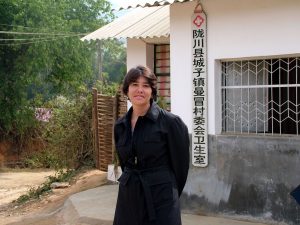Memo #235
By Elanah Uretsky – euretsky [at] gwu.edu
 As China’s economy has grown, so has its burden of disease. Excessive practices of smoking, drinking and eating, along with a growing commercial sex industry, are leading to epidemics of cancer, diabetes, stroke, other cardio-vascular diseases and sexually transmitted infections. Something must be done about this before it threatens China’s economic growth, but the response must fit the problem.
As China’s economy has grown, so has its burden of disease. Excessive practices of smoking, drinking and eating, along with a growing commercial sex industry, are leading to epidemics of cancer, diabetes, stroke, other cardio-vascular diseases and sexually transmitted infections. Something must be done about this before it threatens China’s economic growth, but the response must fit the problem.
We are taught to look at these diseases independently and associate them with the behaviours an individual chooses to engage in. Smoking is seen as an individual choice that can cause lung cancer; prevention of which usually comes in the form of information provided to those individuals about the biological risks of smoking. The same individual may also drink but that is treated separately.
Such approaches will likely fail in an environment where drinking, eating, smoking and even commercial sex are performed within the guise of a singular ritual called yingchou that promotes collective smoking, drinking, eating and commercial sex among men. Yingchou was used to create social bonds among elite men during China’s imperial era. Today, wealthy businessmen and government officials daily rely on these same rituals to build the trusting relationships known as guanxi that ensure success in China’s market economy. So dependent are the establishment and maintenance of these relationships on yingchou that men can engage in ritualized forms of eating, drinking, smoking and soliciting commercial sex together from lunch until the early hours of the next morning several times each week.
Effective responses to the resulting epidemics will learn from the deeply engrained cultural mechanisms that prompt Chinese people (mostly men) to eat and drink excessively, constantly exchange cigarettes and buy services from commercial sex workers.
In coming years, many Chinese men suffering from tobacco-related illnesses will need to visit thoracic surgeons, while alcohol-related illnesses will send others to liver specialists. Those with STIs or HIV may require various courses of antibiotics and anti-retroviral therapies. But while these illnesses require distinct biomedical treatments, they often share a common cause—the singular ritual practice of yingchou. Effective public health efforts should take a collective approach that engages these rituals rather than only approaching individuals in their prevention efforts.
About the Author:
Elanah Uretsky is an assistant professor in the Department of Global Health at George Washington University.
Links:
- The risk of success: cultural determinants of chronic disease and sexually transmitted infections among urban Chinese men. Health Promotion International 26(2): 212-219, 2011 (By Elanah Uretsky)
- Rapid health transition in China, 1990–2010: findings from the Global Burden of Disease Study 2010. The Lancet 381 (9882):1987-2015
Related Memos:
- See our other memos on China

Comments are closed, but trackbacks and pingbacks are open.